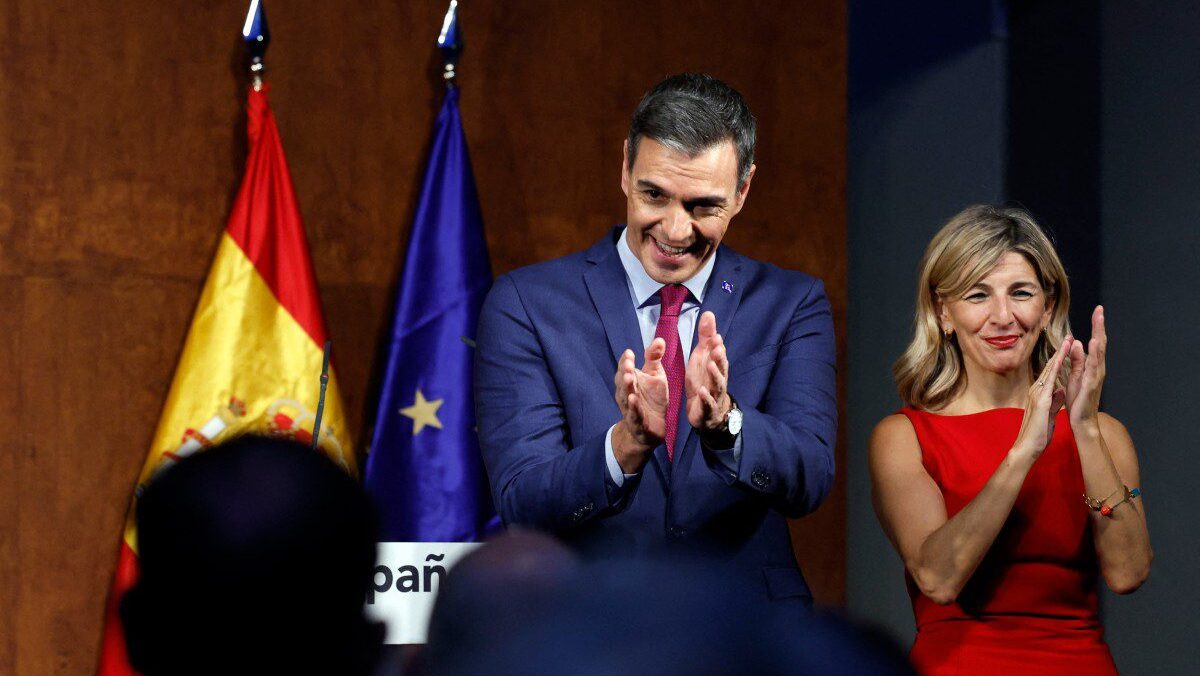
Spain’s acting Prime Minister and Secretary General of the Socialist Party Pedro Sánchez (L) and the acting labour minister and founder of the alliance of far-left parties Sumar, Yolanda Diaz, applaud after signing an agreement to form a coalition government in Madrid on October 24, 2023.
Photo: OSCAR DEL POZO / AFP
Spain’s socialist and neo-communist parties have announced an agreement that would allow Acting Prime Minister Pedro Sánchez to stay in power for another four years.
Sácnhez, leader of the socialist PSOE, and Yolanda Díaz, acting second vice president and leader of Sumar, Spain’s newest iteration of its political far-left, formally announced their agreement and legislative program on Tuesday evening.
Overall, they promised a progressive coalition government “to continue growing in a sustainable way with quality employment, developing policies based on social and climate justice, and expanding rights, feminist conquests and freedoms.”
Among the specifics, they agreed to increase the public housing stock to 20% of the country’s total housing, strengthen theClimate Change Law, extend family benefits for new births, and promised universal free daycare for children aged 0-3 years old.
They also plan to raise taxes in various ways. The goal is for tax collection to reach 46% of GDP, which would be almost 4 percentage points up from the 42.6% that it currently comes in at. They justify this by saying that Spain’s neighbors are collecting taxes at a similar rate. Sánchez and Díaz are particularly targeting banks and energy companies, and want to introduce a new 15% Corporation Tax that they estimate will raise an additional €10 billion.
They added the objective of full employment in Spain to the legislative agenda by, among other measures, the immediate implementation of a “shock plan” to address youth unemployment.
The programme also includes the controversial measure of reducing the work week to 37.5 hours by 2025, after a transition period of 38.5 hours in 2024.
The big surprise of the program is the planned prohibition of short haul flights. In principle, flights of less than two-and-a-half hours between destinations where a train is available would be prohibited with those that serve as a connection with international destinations exempt, though the details remain unclear.
But the reality is that, despite the show Sánchez and Díaz made of the agreement, the two parties together cannot form a government without the support of Catalan and Basque nationalist parties. Negotiations are ongoing between the socialists and the particularly influential and unsupportive Catalan party Junts per Cat.
Even if Sánchez manages to avoid repeat elections and form a government in November, he may still not be able to achieve any legislative goals, as he will find himself dependent on the far left and separatists to pass most measures.
Parties such as Junts per Cat have no scruples about throwing a wrench in the plans of the Spanish government. Additionally, in the previous legislature, Sánchez’s far-left parliamentary associates did not hesitate to block bills they did not think went far enough.
This may indeed be Spain’s best hope for the next four years—that political gridlock stops the center-left from becoming more extreme.
